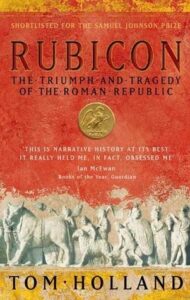 Rubicon, Tom Holland
Rubicon, Tom Holland
With a title like Rubicon, if you know about the significance of that small river, you might expect the book to be mostly about Julius Caesar (if you didn’t notice the subtitle, which differs slightly between editions but always mentions the Republic). It isn’t: in fact, at times early on you might not be quite sure what Caesar has to do with it and what’s even happening to him at the time. Which is fine: there’s plenty going on that you don’t need the big name to make Roman history interesting, but I do think it makes the title a little bit misleading. It’s not really all about that decisive moment of Caesar’s: it’s more broadly about the Republic, and the sense I got was that even if Caesar hadn’t taken the action he did, the end of the Republic would still have come.
Holland’s writing is mostly breezy and easy to follow: sometimes he gets a little too flippant or broad in his translations for my liking (I wouldn’t put it past Romans to call someone a “cocktease”, definitely, but I’ve seen that line translated rather less explosively, too), and sometimes the sheer number of events and names starts to tangle a little. He’s covering quite a lot here, really putting the moment of crossing the Rubicon into context, and it can feel both a little jam-packed and a little dry as he crams everything in.
For the most part a good read, though a fairly traditional account of the doings of men in classical history. (Give me more about Clodia and her influence!)

Leave a Reply